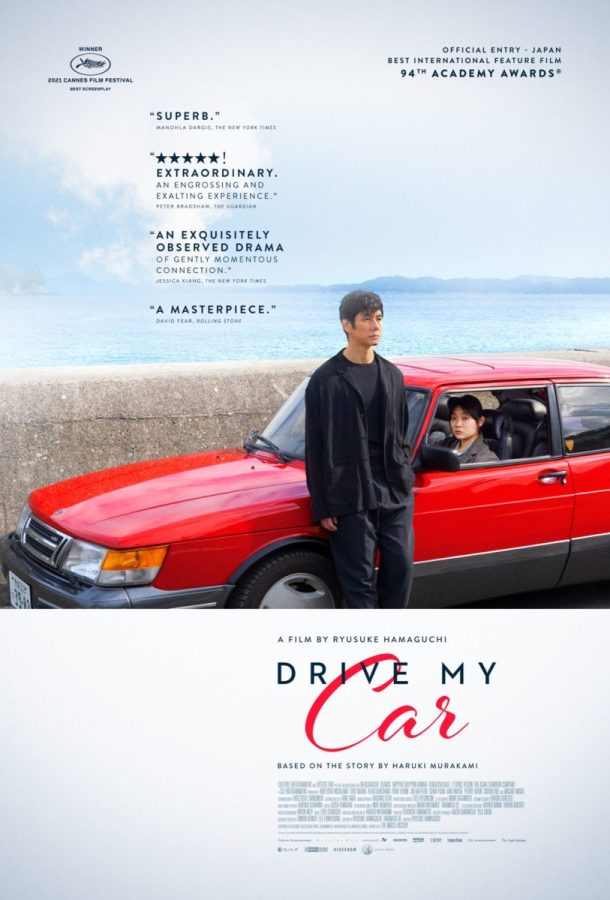“Drive My Car” review: The long and winding road
March 13, 2022
Japanese filmmaker Ryusuke Hamaguchi may not be a household arthouse figure in Western film circles. That has since changed with the American release of his latest film “Drive My Car,” which first premiered last fall at Cannes and is currently nominated for four Academy Awards including Best Picture and Best Director. In fact, the road drama is currently being positioned as the next “Parasite” while at the same time, it may be unlikely due to the film’s three-hour runtime.
Going beyond the perceived relevance of awards season as well as the conflicting attention spans of the modern moviegoer, Hamaguchi’s latest film (one of two released last year, the other being the equally excellent anthology film “Wheel of Fortune and Fantasy”) is an immersive experience that deserves recognition as one of the best films of 2021. “Drive My Car” takes the viewer on a meditative journey of grief, acceptance, and the artistic process, as its characters take the first step of driving ahead to new beginnings and disembarking their own past baggage.
Based on a short story by Haruki Murakami, “Drive My Car” tells the story of Yusuke (Hidetoshi Nishijima), a theatre director dealing with the death of his wife Oto (Reika Kirishima) two years ago. He accepts a two-month residency with a theatre company in Hiroshima, where he is to direct a multilingual production of Anton Chekhov’s play “Uncle Vanya.” Yusuke is also assigned a driver, the 23-year-old Misaki (Tōko Miura). While he initially resents giving up his beloved bright-red Saab, he later bonds with the reserved Misaki as they both come to terms with their own pasts.
The first hour of the film details Yusuke’s relationship with Oto, a screenwriter who likes to come up with stories during sex. He loves his wife very much, even as he is willing to look beyond her infidelities. This unbalanced sense of longing continues after Oto’s sudden death, as Yusuke recites lines from “Uncle Vanya” in his car by listening to a cassette tape that his wife had made for him.
What’s interesting about the film’s plot structure is that Hamaguchi chooses to depict this set-up for the first quarter of the film instead of using flashbacks. It may be in keeping with the film’s vehicular theme of driving ahead and never looking back. This unique set-up becomes necessary as “Drive My Car” truly starts after Oto’s death.
The film then depicts Yusuke’s rehearsals for his experimental take on “Uncle Vanya.” His actors speak their lines in Japanese, Korean, Mandarin, Tagalog, and even in sign language, as a multilingual set of subtitles is projected on a screen above them. While it is an interesting concept, it also has a deeper meaning to it. After all, Chekhov’s play also deals with unspoken emotional truths, something that Yusuke spends most of the film denying the existence of.
Art becomes artifice if there’s no truth to it, and it’s part of the reason why Yusuke stopped acting after his wife’s death. Instead he is merely content to direct the proceedings, even as he gets the play’s dialogue lost in a verbal miasma of foreign tongues and casts a particular young actor against type for the middle-aged title character. Yusuke is so unfocused on his work that at one point he acknowledges that adapting Chekhov can be emotionally draining: “When you say his lines, it drags out the real you.” Add a high-concept linguistic approach and you get a recipe for disaster, devoid of elusive artistic meaning. Still, as Yusuke goes on a long and winding road towards self-acceptance, it all comes together in a resounding climax.
A film like “Drive My Car” is bound to have a lot of moving parts. Some of them may end up feeling contrived, while others may be unnecessary. But Hamaguchi (who co-wrote the Cannes award-winning script with Takamasa Oe) makes it all worthwhile, as he is content to focus on character interactions rather than plot mechanisms. Japanese cinema has had a long tradition of portraying distant characters who tend to keep their emotions inward. Hamaguchi is always a welcome addition, as his tendency for restraint in “Drive My Car” has no room for theatrics. All the viewer has to do is carry the emotional weight of reacting to the immersive experience unfolding in front of him.
I could write more about how “Drive My Car” has affected me as a viewer and as a person. First, it has made me think that top ten lists are fluid and pointless. It also came at a pivotal time in my life as I recently started learning how to drive. Hamaguchi brilliantly infuses the solitary act of driving as a visual metaphor for starting new beginnings and taking charge of your freedom. Life is not merely a movie that ends with death or rejection; rather, it goes on. As one character tells Uncle Vanya towards the end of the play, we just have to go on living.
Click here to stream “Drive My Car” on HBO Max.









